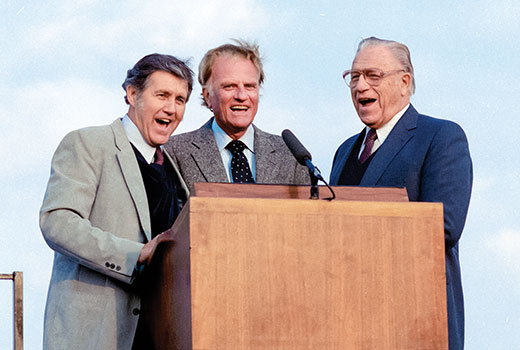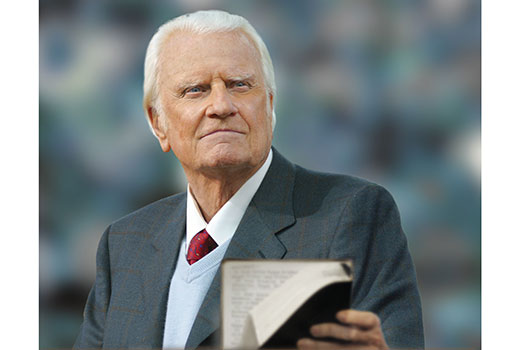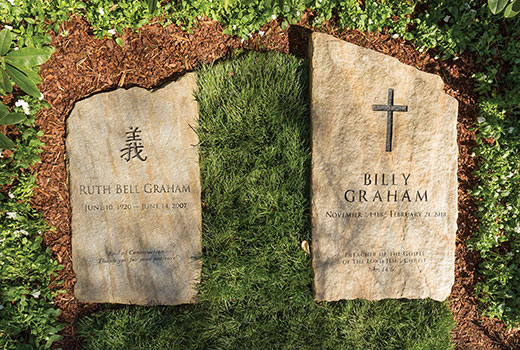William Franklin “Billy” Graham, 99, a dairy farmer’s son and a preacher of the gospel of Jesus Christ, died Feb. 21 at his home in Montreat, N.C. He was laid to rest March 2 in Charlotte.
Saved as a young man under the preaching of a traveling evangelist, Graham felt called by God to become an evangelist himself. “I didn’t have any tears, I didn’t have any emotion, I didn’t hear any thunder, there was no lightning,” he told Time magazine in 1993. “But right there, I made my decision for Christ. It was as simple as that, and as conclusive.”
After college, with Youth for Christ International, Graham started traveling across the country and preaching, often beneath the trusses of a sprawling canvas tent, at events that would later become known as evangelistic crusades. His message was consistent, plain and direct: Repent, and be saved.
In a time when the word “evangelist” had become tarnished as other notable gospelers fell to grift and scandal, Graham and those of his inner circle drew up guidelines that held them accountable to each other for upright behavior and modest compensation. Graham established the Billy Graham Evangelistic Association to separate himself from the financial and business aspects of his ministry.
After a tent meeting in Los Angeles in 1949 caught the interest of newspaper magnate William Randolph Hearst, Graham’s preaching ministry caught fire. In cities all over America and across the sea, his crusades drew hundreds of thousands of people — some of them attracted by the young preacher’s popularity, some drawn to his hopeful message of spiritual rebirth. The tent gave way to concert halls and outdoor stadiums.
As his fame grew, Graham was invited to an audience with the queen of England, and he met and prayed with every American president from Harry Truman to Barack Obama.
But he was never comfortable with fame. “I despise all this attention on me,” he told an interviewer in a 2002 BGEA documentary. “I’m not trying to bring people to myself, nor am I trying to interest people in me. But I know that God has sent me out to preach the gospel … and I must continue until He gives me the signal that I’m to stop.”
Through BGEA, Graham started a magazine (Christianity Today), a radio and television program (“The Hour of Decision”) and began making feature films like “The Restless Ones” that infused the gospel message with plot lines that drew young people to movie theaters, where they would also hear Graham’s invitation to repentance and salvation. A prolific author, Graham wrote 34 books.
But even as the scope of BGEA broadened to reach millions with the gospel message through mass media, publishing and entertainment, Graham never strayed from the early call in his life to preach the gospel. He continued traveling the country and the world, preaching to some 215 million people who attended one of his more than 400 crusades, simulcasts and evangelistic rallies in more than 185 countries and territories. In 1973, an estimated 3.2 million people attended Graham’s crusade — his largest single event ever — in Seoul, South Korea. A 2005 Gallup poll revealed that 35 million people in America — one in six U.S. adults — had heard Billy Graham preach in person.
For others who heard his message, Billy Graham came into their homes by way of the television screen. His regular prime-time broadcasts, which began in 1957, reached millions of households in the U.S. and around the world. In 2013, a 95-year-old Graham sat in a chair and delivered his final public sermon, the culmination of his My Hope America project, which was shown on more than 480 TV stations.
In 2005, Graham held his final crusade, in New York City. Four years earlier, his son Franklin had assumed Graham’s role as chairman of Billy Graham Evangelistic Association. The elder Graham, his health declining, would spend the remainder of his life at the mountainside home where he and his wife raised their five children.
Ruth, his “life partner,” died on June 14, 2007. “We were called by God as a team,” Graham said in a statement at the time. “No one else could have borne the load that she carried. She was a vital and integral part of our ministry, and my work through the years would have been impossible without her encouragement and support.”
In a 2011 interview with Christianity Today, Graham said if he could do anything over again, he would have steered clear of politics. He didn’t regret ministering to leaders of both political parties, he said, but he had “crossed the line” of partisan politics with President Richard Nixon, who was later caught up in the Watergate scandal and resigned.
Graham also expressed remorse over not spending more time with his family during his younger years. In his 1997 memoir, “Just As I Am,” he wrote: “Over the years, the Billy Graham Evangelistic Association and the Team became my second family without my realizing it. Ruth says those of us who were off traveling missed the best part of our lives — enjoying the children as they grew. She is probably right. I was too busy preaching all over the world.”
In the final decade of his life, Graham’s health and mobility continued to decline, as did his eyesight and his ability to speak. His pastor, Don Wilton of First Baptist Church of Spartanburg, S.C., visited Graham nearly every week. “So it was that the Lord allowed me the privilege through the years of holding his hand, of being his feet and seeing for him, until the Lord Jesus called him home,” said Wilton.
In 1993, when asked by David Frost in a PBS interview to contemplate his own death, Graham said, “Well, I’m going to heaven, not on my good works or because I’ve preached to all these people or read the Bible. I’m going to heaven because of what Christ did on the cross.”
As millions of TV viewers watched Graham’s funeral service, they saw the cross of which Graham spoke depicted in a smaller version, this one nailed to the top of his casket by the prisoners at Louisiana State Penitentiary who, at Franklin Graham’s request years before, handcrafted Billy and Ruth Graham’s plywood caskets.
And, on Graham’s gravestone, placed beside his wife’s in the prayer garden of the Billy Graham Library, just a few miles from where he was born, these words: “Preacher of the Gospel of the Lord Jesus Christ.”

With Billy Graham’s death on Feb. 21, so also passed the lone surviving member of a remarkable trio. Choir leader and TV emcee Cliff Barrows and soloist George Beverly Shea joined Billy Graham on the platform at almost every one of his evangelistic crusades. At Graham’s 95th birthday party in 2013, speaking to Graham and others in attendance, Barrows recounted something Graham had told him 68 years earlier: “Cliff, let’s pray the Lord will keep us together till he calls us home or till he comes again.” Shea, the iconic baritone, died in 2013 at age 104. Barrows, who lived in Upstate South Carolina for much of his life, died in November 2016 at age 93. (BGEA)


